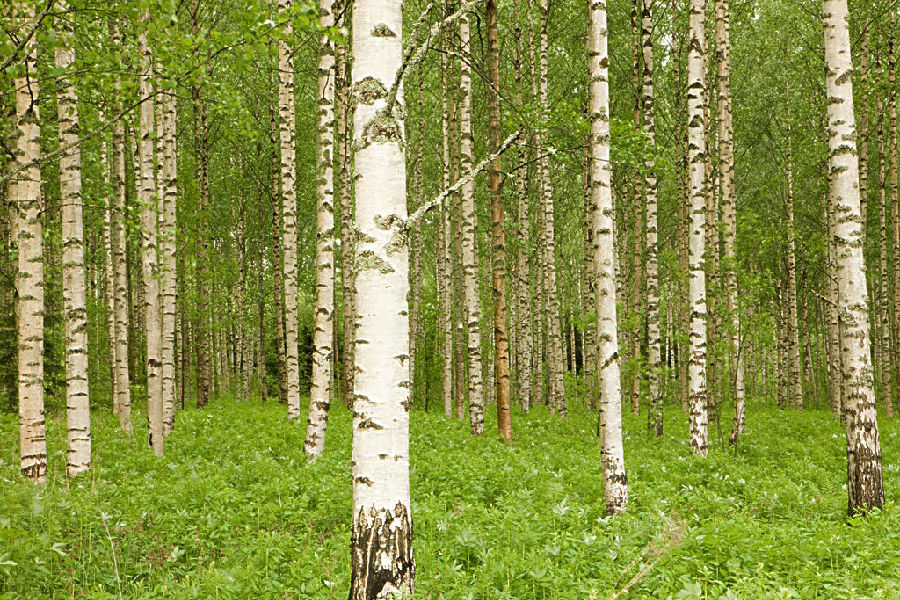(单词翻译:单击)
听力文本
This is Scientific American — 60-Second Science. I'm Erika Beras.
It's easy to see that some plants change from day to night—flowers open and close, and even turn to face the sun. In 1880 Darwin noted that the leaves and seedlings of various plants appeared to engage in nighttime changes that he called sleep. But there's now evidence that some entire trees may have their own version of sleep, which lets them recharge for the following day. That's according to a study in the journal Frontiers in Plant Science.
Researchers used lasers to scan birch trees in both Finland and Austria. They found that the branches drooped by as much as four inches at night compared with daytime.

And exposure to the elements was not responsible—the trees were surveyed from sunset to sunrise over enough time to rule out the changes being caused by wind or other external environmental factors.
The researchers have a couple of ideas about what's causing the branches to slouch. One is that the fluid pressure inside the tree decreases—something like dehydration.
The other proposal is that the trees are actually engaged in a botanical version of sleep. During the daylight hours the leaves perk upwards to get more sun, but with no chance to catch rays at night, they relax. And even before the sun rose, some branches were found to be returning to their daytime position—as the researchers say, perhaps governed by their internal circadian clock in preparation for a new day of light gathering.
But unlike us, there's no evidence that trees sleep in on the weekend.
Thanks for listening for Scientific American — 60-Second Science Science. I'm Erika Beras.
参考译文
这里是科学美国人——60秒科学。我是艾丽卡·贝拉斯。
一些植物的昼夜变化很容易看到,比如花朵的盛开与闭合,甚至是转向面对太阳等。1880年,达尔文指出,各种植物的叶子和幼苗在夜间也会发生变化,他称之为睡眠。但是,现在有证据表明,一些树木可能有自己的休眠类型,这能让它们在第二天精力充沛。该研究结果发表在《植物科学前沿》期刊上。
研究人员用激光扫描了芬兰和奥地利的桦树。他们发现,和白天相比,树枝在夜晚下垂了4英寸。
这与树木接触的环境没有关系,对这些树木的调查时间从日落持续到日出,这段时间足以排除由风或其他外部环境因素引起的变化。
至于树枝为什么会下垂,研究人员有几种猜测。一种观点认为,树木内部的液体流动压力下降——就像失水一样。
另外一种观点认为,树木实际上是在进行植物睡眠。在白天,叶子昂首挺胸以获得更多阳光,但是晚上它们没有机会见到太阳,所以它们就会放松。在太阳升起之前,有些树枝又退回到白天时的位置,正如研究人员所说,也许它们是受到内部生物钟的影响,为新的一天收集阳光做准备。
但是,和我们人类不同的是,目前还没有证据表明树木在周末也会睡觉。
谢谢大家收听科学美国人——60秒科学。我是艾丽卡·贝拉斯。
译文为可可英语翻译,未经授权请勿转载!
重点讲解
重点讲解:
1. engage in 参与;从事;
例句:We are prepared to engage in a dialogue with them.
我们准备同他们进行对话。
2. compared with 与…相比;和…比起来;
例句:They considered this speech mild compared with his former ones.
他们认为他这次的讲话和过去的讲话相比起来还算是温和的。
3. rule out 排除;不予考虑;
例句:We are not ruling out more arrests.
我们不排除会有更多人被捕。
4. a couple of 两个;几个;
例句:The doctor told him to lay off a couple of days.
医生叫他休息几天。


